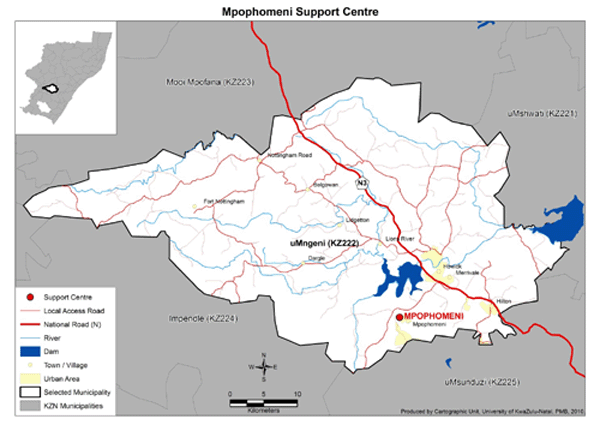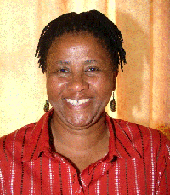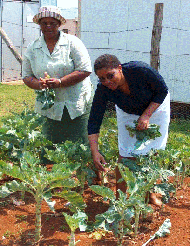 District: Umgungundlovu Municipal District (Midlands of KwaZulu-Natal)
District: Umgungundlovu Municipal District (Midlands of KwaZulu-Natal)
Areas Served: Howick, Mpophomeni, KwaHaza, Mashingeni, Dargle, Curry's Post, surrounding farms
Tel / Fax: 033 238 0750
Email: mpophomeni. ccj@gmail.com
Most common cases: Legal advice, domestic violence and child abuse
Mpophomeni is a township outside Howick. The areas served include Howick and Mpophomeni communities. The infrastructure is basic and typical of all townships, with narrow roads and basic services. There are fifteen schools, and clinics have adequate medical supplies and staff, while the main hospitals are in Pietermaritzburg, 35 kilometres away.
In 2011 the office dealt with 199 cases, with the most common being legal advice (75) and child abuse (42).
Lucky Mkhize

How long have you worked for CCJ?
“There’s a problem with the Domestic Violence Act and the use of protection orders. Often when a protection order is issues, the man feels threatened and just moves out and the relationship is over.” |
Since 2002
What led you to become a support centre coordinator?
I saw there was a need in my community for an office like the support centre. I understand my community and want to help them.
What are the most common cases clients come to you with?
They are child abuse, domestic violence and legal advice, for example about the foster care grant.
Is there any law you would like to change?
There’s a problem with the Domestic Violence Act and the use of protection orders. Often when a protection order is issued, the man feels threatened and just moves out and the relationship is over. Also, there is a problem with the Employment Act: in African culture, when someone dies you have to stay at home for three days to organise the funeral. But this is not provided for in the Act.
Have you had a case where you relied on traditional customs?
We do use traditional laws and the payment of damages for things like pregnancies and insults, like when someone accuses someone of bewitching them.
Would you say people’s attitudes and behaviour are starting to change?
Yes. Police are more cooperative and positive now. People come forward for help more, and women and children are more educated about their rights because of the presentations that we do. Lucky (right) helped start a vegetable garden for clients
Who are your role models?
They are my gran, son and sister. My gran always persevered and took care of us and made sure we had enough of everything.
Can you describe a case that you found particularly rewarding?
It involved a white lady who had been adopted and wanted to get find out who her parents were. She couldn’t get information on her parents and came to me for help. I contacted senior officials at Home Affairs for her and got the right forms. She filled them out and sent them to Social Development and they traced her parents. The lady called me in tears to thank me.
What are the biggest challenges you face in you work?
It is hard to telephone - we get budgets for cellphone calls but I don’t always use them because cellphones are expensive. We need to use the landline more.
What advice would you give children growing up in Mpophomeni?
I would say study, because if you don’t have education you can’t reach your goals. I would tell them to respect their elders, like teachers, and to go to church. I would tell girls to stay single and abstain from sex.